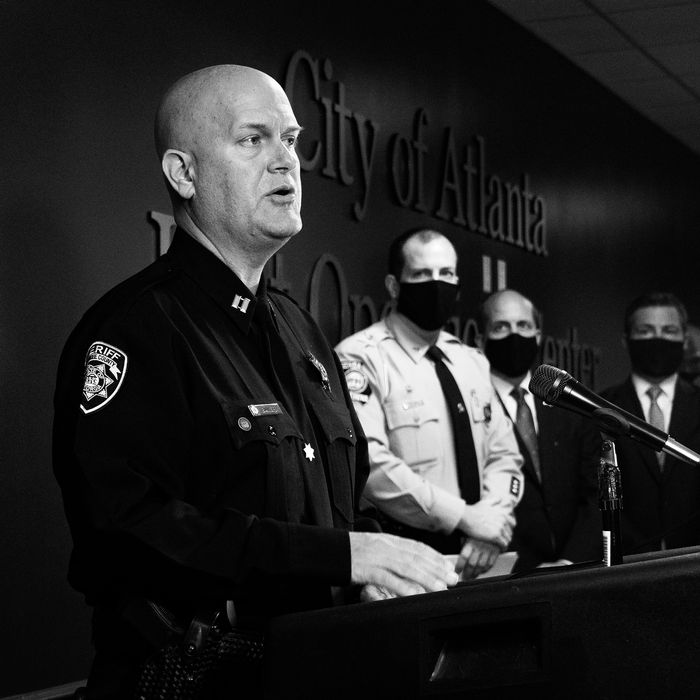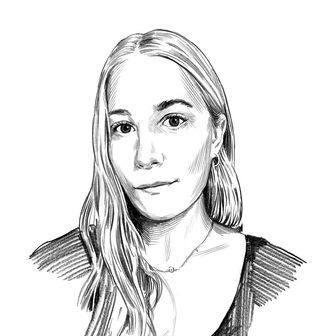
Horrifying reports began circulating last night of a mass shooting at multiple locations in Cherokee County, Georgia. In the hours after, some details were clear: A white man had gone on a shooting rampage at three Asian-owned massage businesses, killing eight people, six of them Asian women. Against a backdrop of rising anti-Asian violence and bias, it seemed obvious what his motivation was. And yet, the next day — “very early” into the investigation, by the officers’ own admission — law enforcement dismissed outright the idea that the shooter could have been motivated by racism. “He claims that it was not racially motivated,” an official with the Cherokee County Sheriff’s Office said at a press conference. “He apparently has an issue … what he considers a sex addiction … and he sees these locations as a temptation that he wanted to eliminate.”
At the end of this gymnastic explanation, which the official seemed at pains to say carefully, even empathetically, the word “eliminate” dropped like an anvil — but reporters carried on, asking the official if the shooter had any “religious motivation.” No one, in the video footage of the press conference at least, immediately challenged him. Think about it again: The shooter wanted to “eliminate” the people who worked at specific businesses in an industry in which workers are predominantly Asian. His victims were predominantly Asian women. And yet it was not a “racially motivated” act, according to the perpetrator, and law enforcement was repeating his claim uncritically. The press conference only grew more ludicrous from there, and more sympathetic to the shooter. “Yesterday was a really bad day for him and this is what he did,” the same official said at another point. The man was “at the end of his rope.” He was “fed up.”
This language is so vague and benign as to completely nullify its incredibly violent referent: The police officer could have been talking about this mass murderer who shot eight people to death in their places of work or about a guy who got pissed off and smashed a mailbox. In simply parroting the killer’s words, and treating them as the objective truth, he doled out a galling, incomprehensible kindness to the shooter and harm to the dead. By characterizing the killer’s actions as apolitical, he erased the identities of the people he killed. Describing massage parlors — which are overwhelmingly staffed by Asian women in vulnerable conditions — as “temptations” is a thin code clearly based in racist, sexist, fetishizing tropes. It extends back centuries in American history, to the Victorian era and beyond. Rather than indicating that the attack was “not racially motivated,” this faux-moralizing rhetoric does the exact opposite. These women were clearly targeted because of their race.
The women killed by the murderer already faced the threat of politicized violence in multiple ways by virtue of who they were and where they worked. Asian massage-parlor workers can be subject to coercive sexual exploitation by the owners of these establishments; they can face higher levels of sexual violence and assault. Many live in poverty and are undocumented, and thus also suffer at the hands of law enforcement. There is a reason that, in the wake of the attacks, sex workers and other grassroots organizers of massage-parlor workers spoke out immediately against more law-enforcement surveillance or “protection.” Asian massage-parlor workers are increasingly criminalized and at risk of violence from the police. A 2017 report from the Urban Institute and the Legal Aid Society said arrests of Asian-identified people in New York City for unlicensed massage and prostitution increased by 2,700 percent between 2012 and 2016.
It is impossible to disentangle the enmeshed, oppressive factors of misogyny, racism, xenophobia, and poverty at play in the shootings in Georgia. It is, accordingly, depressing to see media outlets and pundits delicately parsing what to call this event. The attack was racist; it was also misogynistic, xenophobic, and likely rooted in hatred of sex workers. It can be all these things at once. To unquestioningly repeat law enforcement’s claim that the shooter was “not racially motivated” — and so to echo the logic of a man accused of brutally murdering eight people — is to do real harm to communities that are vulnerable and grieving. To instead name what it really was is to take seriously the lives of the people who died, to consider their murders in the context of history and politics, and to comprehend the conditions in which they lived and struggled. It is an inadequate though not insignificant way to mitigate more pain.
The image on this article was changed to be sensitive to our readers.





